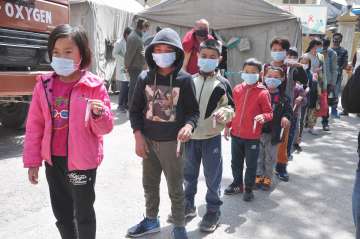There is no reason to believe that children will be disproportionately affected by the coronavirus in the coming weeks and months or the next wave, the head of a government working group said but stressed the need for additional resource inputs to improve the pediatric Covid services.
In an interview with PTI, Dr. N K Arora, Chairman of India's COVID-19 Working Group of the National Technical Advisory Group on Immunisation (NTAGI), said Indian data does not show specific predilection of the currently circulating virus strains either for the youth or pediatric age group.
"However, since the absolute numbers have increased, patients from both age groups are being noticed more,” he said. Arora, who is Director of INCLEN Trust, said it is not possible to predict any third wave at this time.
"But based on what the experience is available from our own country and that from other parts of the world, there is no reason to believe that children will be disproportionately affected in the coming weeks and months or the next wave," he said.
But he stressed the need to improve the pediatric Covid services and align with the rest of the COVID-19 management framework.
"It is necessary to appreciate that newborns, children, and pregnant women require specific care facilities. Children below 10 years will need either mother or father or a care provider with them. Similarly infected pregnant women can deliver prematurely. I am given to understand that treatment protocols are already prepared and are under review by different pediatric groups and associations," he said.
Arora said similarly the unique hospital care requirements are being worked out. "The country is already managing children and most Covid care centers have provision but there is a need for additional resource inputs to improve the pediatric Covid services and align with the rest of the COVID-19 management framework,” he added.
Some experts are highlighting the need for preparation warning that children could be affected by the third wave more than adults. AIIMS Director Randeep Guleria has also said there was no indication that children will be severely or more affected in the third wave of the pandemic.
"If we see the data of the first and second waves, it is very similar and it shows that children are usually protected and even if they get it, they only have a mild infection. And the virus hasn't changed so there is no indication that children will be more affected in the third wave," he told reporters on Monday.
And there is this hypothesis that the virus enters through ACE receptors in the body and these receptors are relatively less in children as compared to adults.
This is a hypothesis on why the infection has been less amongst children, he said. "Those who floated this theory said that children have so far been not affected so perhaps they will be most affected in the third wave but there is so far no evidence that there will be a severe infection in children or there will be more cases in them in the upcoming wave," Guleria added.
The Indian Academy of Paediatrics recently said though children appear as susceptible as adults it is "highly unlikely that the third wave will predominantly or exclusively affect children".
“We need to be prepared with more in-patient beds and intensive care beds for children,” it said. The country's apex child rights body National Commission for Protection of Child Rights (NCPCR) has also said that the Centre and states should ramp up their preparations to protect children and neonatal.
Also Read: COVID-19 can't be beaten one country at a time: Guterres
Also Read: Free Coronil kits for Covid patients in Haryana: Anil Vij
Latest India News
